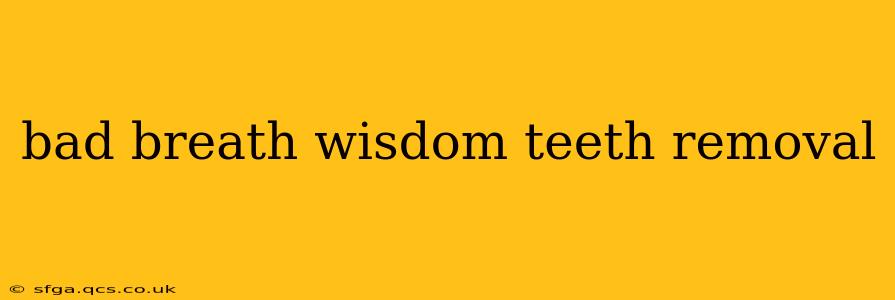Wisdom teeth removal is a common procedure, but it often leaves patients with a lingering concern: bad breath. Understanding the causes of post-operative halitosis is crucial for managing it effectively and ensuring a smooth recovery. This comprehensive guide explores the reasons behind bad breath after wisdom teeth extraction, offering practical solutions and preventative measures.
Why Do I Have Bad Breath After Wisdom Teeth Removal?
The unpleasant odor following wisdom teeth extraction stems from several factors, all directly related to the healing process. Let's delve into the primary culprits:
-
Blood Clots: The initial formation of blood clots in the extraction sites is vital for healing. However, decomposing blood clots can contribute to a foul smell. This is usually temporary and resolves as the healing progresses.
-
Food Debris: The extraction sites are vulnerable during the healing period. Food particles can easily get trapped in the sockets, leading to bacterial growth and subsequent bad breath. Careful attention to oral hygiene is crucial to prevent this.
-
Infection: In some cases, a bacterial infection can develop in the extraction sites. This is a more serious complication that manifests as persistent bad breath alongside other symptoms such as swelling, pain, and fever. Seeking immediate dental attention is necessary if an infection is suspected.
-
Dry Socket: A dry socket, or alveolar osteitis, occurs when the blood clot dislodges from the extraction site prematurely. This exposes the underlying bone and nerve endings, causing significant pain and often, a particularly unpleasant odor. This is a more severe complication that needs professional dental care.
-
Oral Hygiene Neglect: Inadequate oral hygiene practices before and after surgery can exacerbate bad breath. This includes failing to brush and floss regularly, or not following post-operative instructions diligently.
How Long Does Bad Breath Last After Wisdom Teeth Removal?
The duration of post-operative bad breath varies depending on several factors, including the individual's healing process, the complexity of the surgery, and the diligence of post-operative care. Generally, mild bad breath associated with blood clots and food debris should subside within a few days to a week. However, persistent bad breath could indicate a more significant issue requiring professional attention. If the bad breath persists beyond a week or is accompanied by other symptoms, consult your dentist or oral surgeon immediately.
What Can I Do to Prevent Bad Breath After Wisdom Teeth Removal?
Proactive measures are vital in minimizing the risk of post-operative halitosis:
-
Maintain excellent oral hygiene: Gentle brushing and rinsing are crucial, but avoid disturbing the extraction sites directly. Use a soft-bristled toothbrush and a prescribed mouthwash.
-
Follow post-operative instructions: Your oral surgeon will provide detailed instructions. Adherence to these instructions is crucial for a smooth recovery and minimizing the risk of complications, including bad breath.
-
Eat a soft diet: Avoid hard or crunchy foods that can dislodge blood clots or get trapped in the extraction sites. Stick to soft, easily digestible foods for the first few days.
-
Stay hydrated: Drinking plenty of water helps rinse away food debris and bacteria.
-
Avoid smoking and alcohol: Smoking and alcohol can interfere with healing and increase the risk of infection, both contributing to bad breath.
Is Bad Breath a Sign of Infection After Wisdom Teeth Removal?
While bad breath can be a symptom of infection, it's not always an indicator. Other signs of infection include:
- Persistent swelling: Swelling that doesn't subside within a few days or worsens.
- Increased pain: Pain that intensifies rather than diminishes.
- Fever: A temperature above 100.4°F (38°C).
- Pus: Noticeable pus or discharge from the extraction sites.
- Redness and inflammation: Significant redness and inflammation around the extraction sites.
If you experience any of these symptoms along with persistent bad breath, it is crucial to contact your dentist or oral surgeon immediately.
How Can I Get Rid of Bad Breath After Wisdom Teeth Removal?
Gentle rinsing with a prescribed mouthwash is typically recommended. Avoid vigorous rinsing or swishing, which can dislodge the blood clots. Maintaining good oral hygiene, as detailed above, is paramount.
When Should I See a Dentist After Wisdom Teeth Removal?
Regular follow-up appointments are essential for monitoring the healing process. Contact your dentist or oral surgeon immediately if you experience persistent bad breath, significant pain, swelling, fever, or any other concerning symptoms.
This information is for general knowledge and does not constitute medical advice. Always consult with a dental professional for any concerns regarding your oral health.
